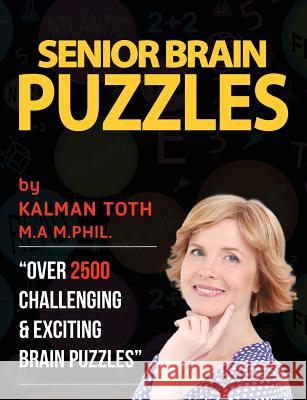Senior Brain Puzzles: Keep Your Brain Young & Vibrant » książka
Senior Brain Puzzles: Keep Your Brain Young & Vibrant
ISBN-13: 9781515167648 / Angielski / Miękka / 2015 / 502 str.
USA doctors recommend daily puzzle solving for seniors to improve brain functions. Make your brain younger Sharpen your mental alertness Improve your quality of life #1 bestseller puzzle book for senior adults. Puzzle solving cuts Alzheimer's risk - according to the latest scientific research The entertaining puzzle book is specifically designed for active seniors to keep their brains in top operating condition. The book can also provide successful brain therapy for seniors with Alzheimer's or Parkinson's disease and stroke patients struggling with dementia. Even the person who may not have done puzzles in the past may enjoy this brain activity. The puzzles have been simplified for patient success. Early stage patients can do the harder puzzles provided in this book. There are also easier puzzles. For example, word search puzzles have a checklist. Solvers simply have to checkmark the list and circle the words. Intelligence Quotient - IQ - is a scientific assessment of an individual's intelligence. A person's IQ derives from measuring problem-solving abilities, memory, general knowledge, and spatial imagery. Alzheimer's, Parkinson's, and stroke patients use to have an effective (every day) IQ of 100-120 Now, due to brain chemistry, their effective IQ is below 100 and can be as low as 70. The goal is to keep effective IQ as high as possible in the damaged brain, and working puzzles can help. A puzzle can help stimulate brain thinking, memory, and brain activity. The variety found is this book is essential for achieving the greatest benefit from puzzle solving. Patients gain the most value from solving the first puzzle of a particular type. Once a number of the same type of puzzle is completed, the patient needs to move to a different type of puzzle. Generally, the patient will need to have assistance from a caregiver or family member. Caregivers of patients have reported positive results when using puzzles, including giving the patient a sense of accomplishment and opening doors for communication between the patient and the caregiver. Family members and friends provide a familiar setting that may encourage more frequent participation in puzzle solving activities. A stroke survivor can enjoy building skills by working a simple puzzle with a spouse or grandchild without even thinking of it as therapy. Benefits of Puzzles Puzzles are widely accepted as brain exercises that can help slow down the progression of Alzheimer's disease and other brain degradation problems. "The impact of ordinary activities like listening to the radio, reading newspapers, playing puzzle games, and visiting museums...After 4 years, the risk of developing Alzheimer's disease was 47 percent lower, on average, for those who did the activities most often than for those who did them least frequently." - National Institute on Aging. Brain puzzles strengthen the brain of all adults Such brain boost is especially important for older adults since they don't get the daily dose of brain stimulation from working or running a business. Brain puzzles solving that's enjoyable, challenging & mentally stimulating vastly improves the senior's quality of life in retirement.
Zawartość książki może nie spełniać oczekiwań – reklamacje nie obejmują treści, która mogła nie być redakcyjnie ani merytorycznie opracowana.











